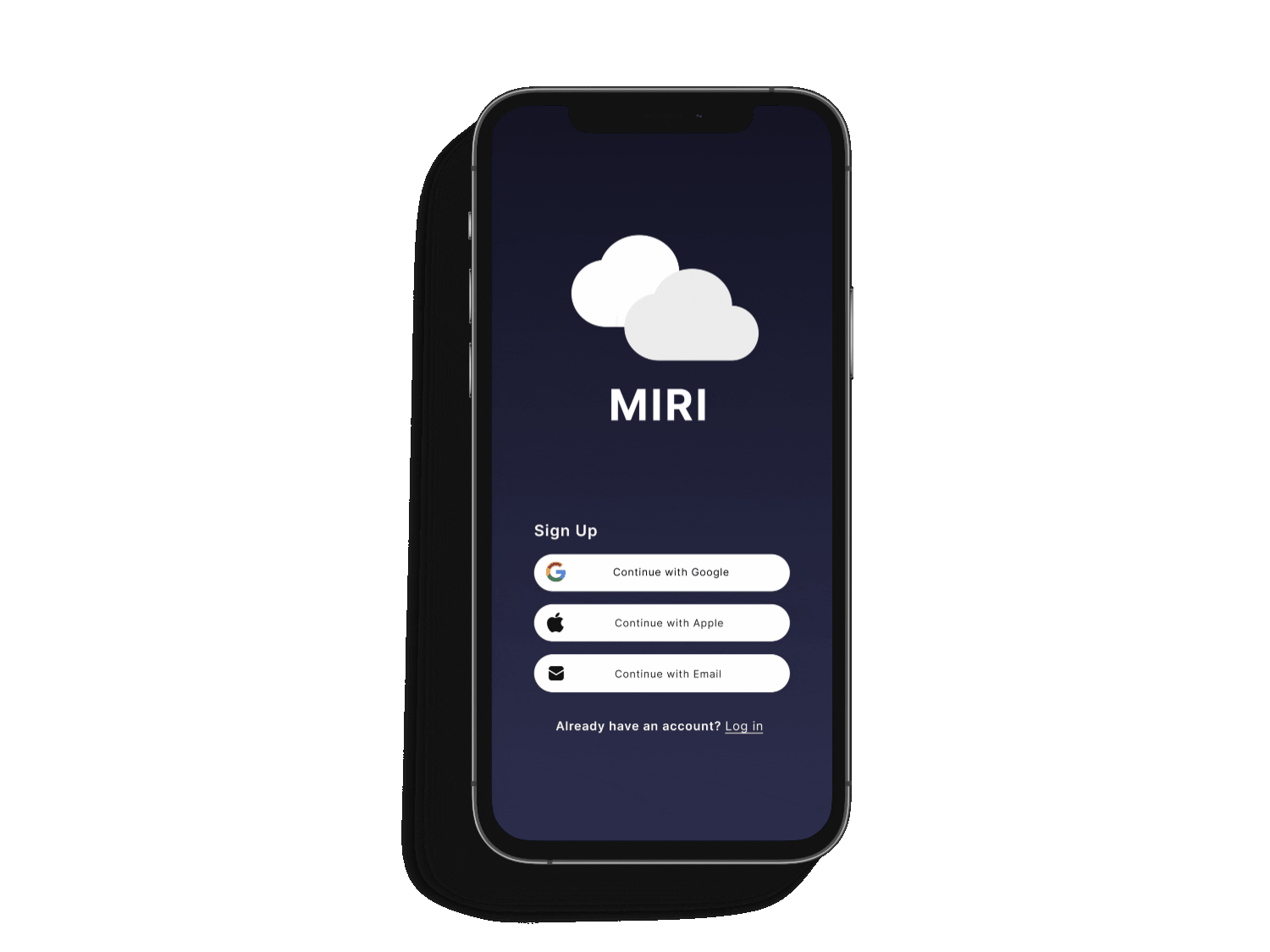


Designing accessible mental health support for Mothers
Sunlife designathon 2024
I designed a mental health support app to help mothers feel less alone.
Miri is a digital platform built to support mothers navigating postpartum mental health. The app combines AI-driven chat therapy, guided journaling, and local event discovery to create a holistic, accessible space for emotional wellbeing.
Through user interviews with new and expecting mothers, we uncovered three key barriers: difficulty accessing affordable therapy, feelings of isolation, and a limited opportunities for in-person community support.
To address this, I led the design of a, AI-powered chat therapy interface for on-demand emotional support, a mood-based journaling flow to help users track their mental wellbeing, and a local event finder that connects mothers with nearby peer support and community meetups.
By designing with empathy and direct user input, we built Miri to lower the barriers to mental health access—and create space for mothers to feel seen, heard, and supported.
Collaborators
Developers
Product Designers
SunLife Mentor
Team
5 GBDA Students
Problem space
1 in 7 mothers experience postpartum depression, yet nearly half don’t receive the help they need. Many face barriers like the high cost of therapy, feelings of isolation, and limited local peer support, leaving them to navigate mental health challenges alone.
To address this, we designed Miri: a digital platform offering AI-powered chat therapy for on-demand support, mood-based journaling to help mothers track emotional wellbeing, and a local event finder connecting them to peer-led meetups. Built around real user insights, Miri lowers barriers to care and helps mothers feel seen, supported, and less alone.
How might we design a digital platform that helps mothers easily access mental health support, feel isolated, and discover local, affordable community resources during and after postpartum?
DESIGN CHALLENGE


User Flow
After mapping out the key interactions, I developed a streamlined user flow centered around Miri’s three core features: chat, journal, and community.
This flow starts with onboarding and profiling to personalize each user’s experience, then naturally guides them through daily mood check-ins, AI-supported chats, and reflective journaling. It concludes with community engagement and actionable next steps to help users feel supported and motivated.
This happy path became the foundation for prototyping and further visual design.

Tone
&
Touch
I began designing Miri by first exploring how the app should feel for new mothers navigating postpartum challenges. Through research, moodboards, and competitive analysis, I focused on defining an emotive prelude, tone of voice, and overall vibe that would resonate: gentle, reassuring, and empathetic—like a supportive companion rather than a clinical tool. This foundation guided visual decisions, language choices, and interactions, ensuring that every touchpoint felt safe, calming, and thoughtfully human.

Design Inspiration
For visual inspiration, I explored a range of apps beyond just mental health tools. I specifically looked at chatbots, community event pages, journaling apps, and sign-in/onboarding screens to see how they guide users and build trust.
What I noticed was that products with conversational interfaces often use a kind, friendly tone right from the start – making the experience feel more human and less transactional. This felt especially suitable for Miri, since the goal is to create a supportive, approachable space for users.
I drew inspiration from apps like Woebot and Replika for chatbot flows, Eventbrite and Meetup for community pages, and journaling tools like Reflectly and Daylio for simple, calming layouts. Even the sign-in screens of apps like Headspace and Calm use soft language and playful visuals to make users feel welcome rather than pressured – a tone we decided to bring into Miri’s introduction and onboarding too.
(Sources: screenshots and flows from Wysa, Pi, ChatGPT, Ticketmaster, Evenbrite, Mighty, Day One, Reflectly.)


Final
product
The final product for Miri is a clean, user-friendly mental health app for mothers in Canada. It combines three main features — chat, journal, and community — into one seamless experience.
Starting with a quick onboarding and mood check-in, Miri personalizes support based on user responses. The AI chat offers real-time guidance, the journal encourages daily reflection, and the community space connects users with others facing similar challenges.
Overall, Miri makes finding mental health support feel approachable, personalized, and easy to use.

Meet our team :)
Nish, Antoinette, Saskia, Grace (Me) & Travis!
Learnings
&
Takeaways
Designing with success metrics
Through working on Miri, I learned to define and track success beyond just aesthetic quality. Measuring engagement rates on features like mood check-ins and journal entries made my design decisions more intentional and data-driven.
Collaborating across design specialties
I enjoyed collaborating with teammates who specialized in areas like graphic design and branding. Seeing how different design disciplines came together to shape a cohesive product taught me the power of cross-functional creativity.
Working under time pressure
This was my first time participating in a designathon, which meant designing and iterating quickly under a tight deadline. It challenged me to prioritize core features, make decisions efficiently, and still keep the user experience front and centre.
